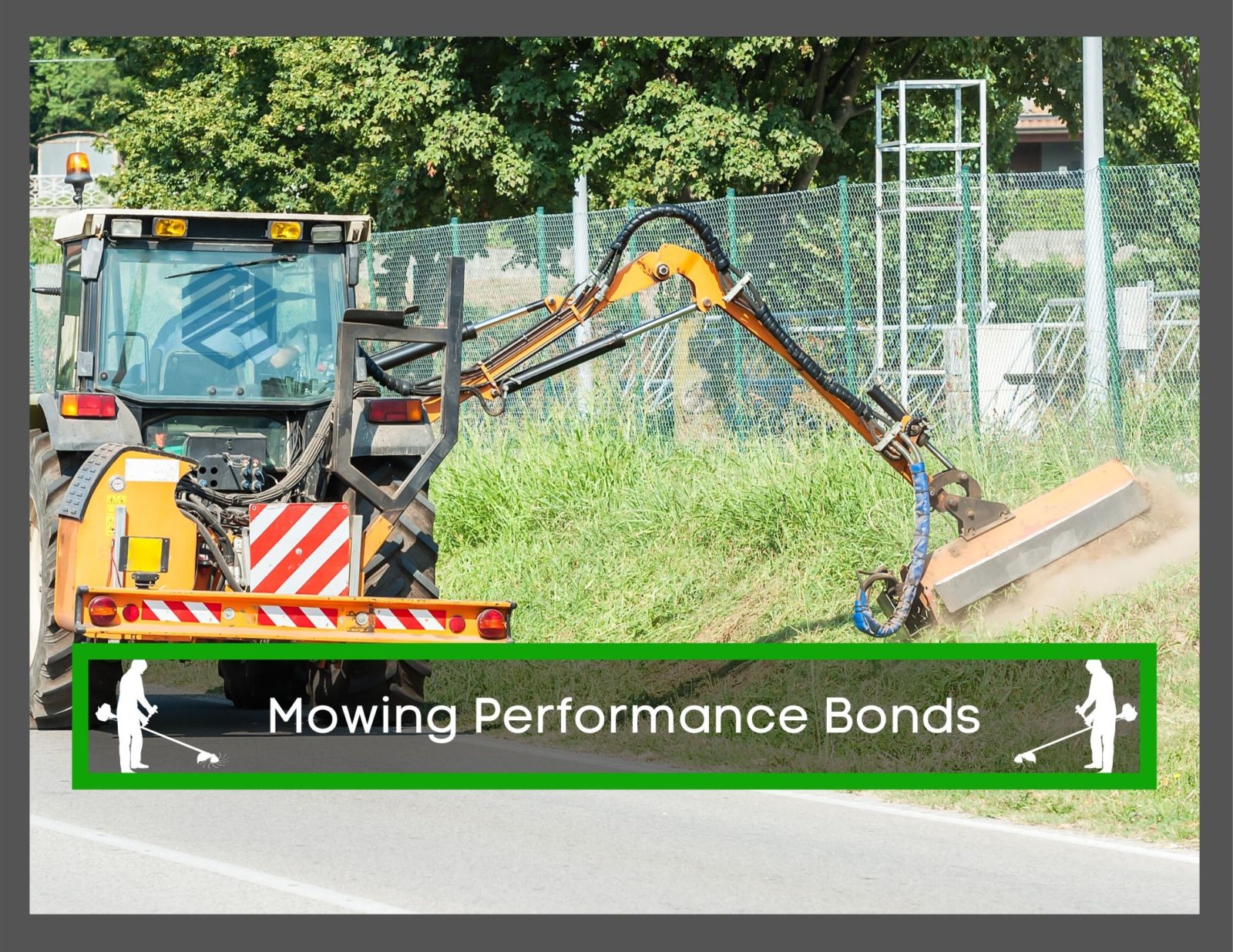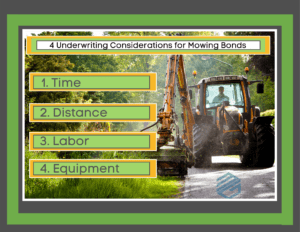Often when lawn mowing companies make the jump to public work, they are not sure what a mower performance bond is or how to get one. There are things that can make these bonds tricky, but most contractors should have very little trouble. The weather is warming up, the grass is growing and below is everything a contractor needs to know about getting a mower performance bond.
What is a Mowing Performance Bond?
Lawn Mowing performance bonds are a guarantee that a contractor is going to be able to perform the work they agreed to under a contract. Mowing bonds are a type of surety bond that are generally considered to fall under the category of service contracts which you can read more about here. With a mowing performance bond, the contractor must perform the mowing required by the contract. If the mowing contractor does not or cannot perform, the owner (obligee) can make a claim against the performance bond. If the claim, is found to be valid, the bond company will have to step in. You can read more about performance bond claims here. The important thing to remember with performance bond claims is that they are not insurance. Any losses incurred by the surety bond company will come back against the company and other indemnitors. This is known as the Principle of Indemnity and should be understood by contractors before providing the bonds.
When are Performance Mowing Bonds Required?
Because of the Federal Miller Act, these bonds are required on Federal mowing contracts over $150,000. Most states have similar requirements, although the amounts may be different. Therefore, if a contractor wants to do mowing on public property, they will likely have to post a mowing performance bond at some point. Contractors may even need a bid bond before they can bid on these projects. Private owners can also require lawn mowers to post performance bonds, but this is less common.
Underwriting Considerations:
Length of Contract:
The first thing a surety bond underwriter needs to understand is the length of time for the contract. Will the contract cover one year or multiple periods? Circumstances can change quickly so surety bond underwriters typically prefer shorter contracts. If a multiple year contract is required, the bond company usually prefers to add contract language requiring a mutual agreement to renew by all parties. Contractors should also bid multiple year contracts with cushion against price increases such as labor, fuel, and equipment escalators.
Labor:
Often, one of the biggest risks for completing a mowing contract is the labor. Does a contractor have enough people to perform the work? Is there a plan for pay increases if necessary, to keep workers? What if weather or other delays cause a contractor to get behind? Can they pay overtime or add labor to catch up?
Equipment:
Will the contractor have to buy equipment to complete the contract? If so, will the equipment be expensed in the project or will the contractor need other work to pay for the equipment? What about adequate mobilization costs? Mower equipment needs to be moved around regularly. Has the contractor included these in their estimates?
Distance:
When bidding Department Of Transportation projects, the areas under contractor can often be spread out far apart. How far a contractor and their labor must travel can make or break these contracts. It can be difficult to keep up with growing grass if the time between sites is too far.
Costs of Mowing Performance Bonds
The cost of a mowing performance bond is priced like most other performance bonds. You can read more about that here. In general, the stronger the account, the lower the rate. However, contractors need to be careful when bidding these projects because the bonds are often renewable annually. That means the premium will be due everyone year of the contract. Contractors that do not price this into their estimates, may suddenly find themselves losing money.
How Do You Get a Performance Bond for Mowing Contracts?
For contracts of less than $500,000 in value, a bond can usually be written with an easy application and credit check. Larger contracts or contracts that are long term, will have to go through full underwriting which means the company needs to provide an application, company financial statements and personal financial statements on owners. We often refer to this as part of the 3 C’s underwriting that you can read about here.
SBA is an Option for Mower Performance Bonds
For contractors that may not qualify for these bonds in the “standard” market, the SBA is an option. The Surety Bond Guarantee Program can be a great way to help contractors qualify. You can read more about the program here. However, the SBA can consider a contractor’s unused bank line for working capital considerations. This is a huge benefit to the contractor. The program can also support those with less than perfect credit situations. To qualify for SBA support, the contract and bond form do need to be renewable annually, however. This could prevent a contractor from using the program in some situations. The contractor also needs to consider cost as the SBA program will add an additional 0.6% to the bond premium.
Performing mowing work for public entities can be a great way to increase your profits. Being bondable may open additional doors for contractors to grow. MG Surety Bonds works with 25+ bond companies and has the expertise to help contractors in all situations. Contact us to so that we can help you with your mowing performance bond needs. You can also check out our Frequently Asked Questions Page for more information about Performance Bonds.


